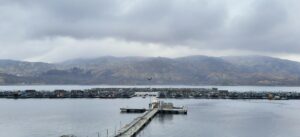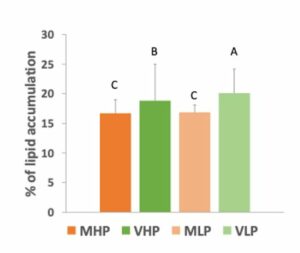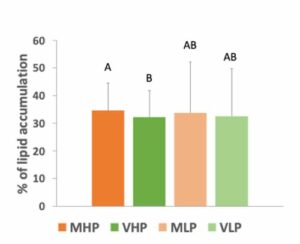Can we program Atlantic salmon to improve the utilisation of vegetable ingredients in feed?
Nutritional programming is a tool which has been studied in different aquaculture species with an aim to improve the utilisation of plant-based feed ingredients. Researchers at the University of Stirling’s Institute of Aquaculture are trying to implement this tool in Atlantic salmon.
Why are we looking to improve the use of vegetable ingredients?
In recent years, a substantial achievement has been made in substituting the commonly used ingredients, fishmeal and fish oil, in feeds for aquaculture, due to the high demand and decreased availability of these resources around the globe. As a result, terrestrial plant ingredients are now widely used as raw materials in aquafeeds, replacing fishmeal and oil, and altering the nutritional profile of fish, specifically the health beneficial fatty acids naturally present in marine ingredients. The search for new approaches in facilitating fish to cope with these new diets without altering their health, overall performance and boost their nutritional value is of current concern.
Nutritional programming
This concept is built on the idea of applying an external or internal stimulus to an organism during certain windows of development, especially during high plasticity events, to create adaptive changes with lifetime consequences in health at the adult phase (1). Previous studies in Atlantic salmon have shown that it is possible to improve the utilisation of vegetable diets in salmon when stimulus is given early in the freshwater period (2). Moreover, physiological adaptations at the molecular level were observed in the group given the vegetable stimuli after being challenged with a plant-based feed (3). However, little is known about the extent of these effects in the seawater phase and whether there is any interaction with the genetic background of the fish.
Feed trial
A trial was performed using freshwater tanks at the Niall Bromage Freshwater Research Unit in Buckieburn (University of Stirling) as well as at Mowi’s Feed Trials Unit in Ardnish (seawater experimental facilities Fig. 1), both in Scotland. A vegetable-based feed and a marine diet were given as the ‘stimulus’ during the first 3 weeks of external feeding to two groups of Atlantic salmon with different flesh pigment retention (high and low) as their genetic background. After the stimulus, both groups were fed a commercial marine diet until a few months after their transfer to seawater when they were challenged with a vegetable-based diet until harvest. During the trial, samples were taken from whole fish and different organs to evaluate the outcomes of the programming. Weights, mortalities, feed intake and environmental data were recorded for performance calculations.

Figure 1. Ardnish, Mowi experimental seawater facilities in Scotland
Results
Some interactions were found between both genetic background and the nutritional stimulus during the early stages of the freshwater phase on growth parameters. However, the impact of genetic background alone was more consistent throughout the trial. Another interesting finding is the fact that liver from fish stimulated earlier with a vegetable-based feed showed a lower adaptation to these ingredients before the start of the challenge in seawater timepoint (Fig. 2), where they were receiving a marine formulated diet. However, that changed once fish were exposed to the vegetable feed, with the marine stimulated fish less able to cope with the change in diet (Fig. 3), indicating that the vegetable stimulus may have an impact on how fish adapt to the new feed.

Fig. 2. Lipid vacuolization pre-challenge.

Fig. 3. Lipid vacuolization during challenge.
MHP, Fish fed marine feed at stimulus, high pigment retention; VHP, fish fed vegetable feed at stimulus, high pigment retention; MLP, fish fed marine feed at stimulus, low pigment retention; VLP, fish fed vegetable feed at stimulus, low pigment retention.
Further analyses are being performed to determine whether there are nutritional programming effects during the whole lifecycle of Atlantic salmon (e.g. differences in genome-wide methylation) and to fully understand the mechanisms underlying this process. More importantly, we are assessing whether this is a tool that can be used by the industry to improve aquaculture practices.
References
1.- Lucas, A (1998). Programming by early nutrition: an experimental approach. The Journal of nutrition, 128 (2), 401S-406S.
2.- Clarkson, M., Migaud, H., Metochis, C., Vera, L. M., Leeming, D., Tocher, D. R., & Taylor, J. F (2017). Early nutritional intervention can improve utilisation of vegetable-based diets in diploid and triploid Atlantic salmon (Salmo salar L.). British Journal of Nutrition, 118 (1), 17-29.
3.- Vera, L. M., Metochis, C., Taylor, J. F., Clarkson, M., Skjaerven, K. H., Migaud, H., & Tocher, D. R (2017). Early nutritional programming affects liver transcriptome in diploid and triploid Atlantic salmon, Salmo salar. BMC genomics, 18 (1), 886.
Authors:
Mónica Betancor, Karla Fernández, Stuart McMillan. University of Stirling (UoS), Scotland, UK.
